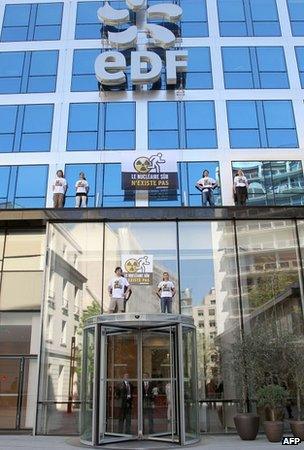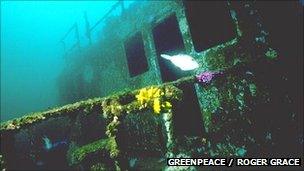EDF fined for spying on Greenpeace nuclear campaign
- Published

Activists have targeted EDF repeatedly
A French court has fined energy giant EDF 1.5 million euros (£1.3 million) and sent two of its staff to jail for spying on Greenpeace campaigners.
The company is hoping to build four nuclear reactors in the UK.
A court in Nanterre, near Paris, found that EDF employed security firm Kargus to spy on Greenpeace as it campaigned against new reactors in France.
The court also sent two Kargus employees to jail and handed Greenpeace 500,000 euros (£428,000) in damages.
Greenpeace's campaign targeted in particular the new reactor being built at Flammanville on the Normandy coast, one of the European Pressurised Water Reactors (EPRs) that EDF hopes to bring to the UK.
Adelaide Colin, communications director for Greenpeace in France, said the decision "sends a strong signal to the nuclear industry: no-one is above the law".
The court heard that in 2006 Kargus Consultants, then run by a former member of the French foreign secret service, compiled a dossier on Greenpeace via means that included hacking into a computer belonging to former campaigns head Yannick Jadot.
EDF maintained that it had just asked Kargus to monitor the activists, and that the consultants had exceeded their remit.
But justice Isabelle Prevost-Desprez disagreed, handing three-year sentences to Pascal Durieux and Pierre-Paul Francois, head and deputy head of EDF's nuclear security operation.
Thierry Lorho, then head of Kargus, also received three years, and information specialist Alain Quiros two.
All also have to pay compensation to Greenpeace.
EDF did not return calls from BBC News, but its lawyer told Reuters news agency in Paris that the company would appeal against the decision.
Rainbow echoes
Through its ownership of British Energy, EDF runs eight nuclear stations in the UK and plans to build four new reactors, two each at Sizewell in Suffolk and Hinkley Point in Somerset.

The case has brought back memories of the sinking of Rainbow Warrior in 1985
These will probably be EPRs.
Although EDF and the constructors Areva laud the EPR's substantial power and safety features, the two in construction at Flammanville and Olkiluoto in Finland are both behind schedule and over budget.
Tom Burke, formerly head of Friends of the Earth UK and a visiting professor at Imperial and University Colleges in London, said the spying case showed EDF was desperate to negate criticism of nuclear power.
"What this judgement reveals is that EDF, and the French government which owns it, are prepared to go to any lengths, including breaking the law, in order to defeat opposition to more nuclear power," he told BBC News.
"The whole future of the French plan to sell more nuclear power to the world depends on getting the British consumer to pay to build new nuclear reactors in Britain.
"I would advise every critic of the French drive to expand nuclear power in Britain to be very vigilant in ensuring they are not themselves victims of EDF dirty tricks."
Greenpeace has said in the past that it suspected EDF of using "dirty tricks" against it in the UK as well as in France - a charge that the company has denied.
In the wake of the French verdict, Greenpeace has asked the company to "come clean".
For some, this episode evokes memories of the Rainbow Warrior sinking in New Zealand in 1985.
Then, with French government backing, foreign intelligence service personnel mined and sank the Greenpeace vessel in a bid to prevent it interfering with nuclear testing in the Pacific.
Follow Richard on Twitter, external
- Published9 November 2011
- Published19 July 2011
- Published20 March 2011
- Published17 March 2011